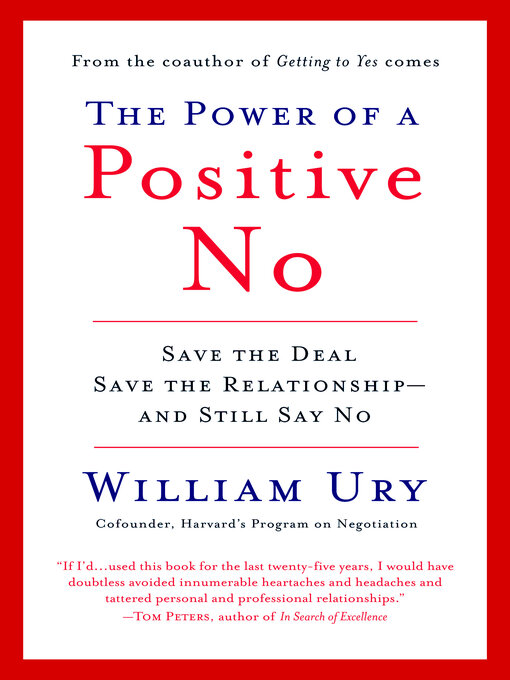
“In this wonderful book, William Ury teaches us how to say No—with grace and effect—so that we might create an even better Yes.”—Jim Collins, author of Good to Great
In The Power of a Positive No, William Ury of Harvard Law School’s Program on Negotiation teaches you how to take the next step toward getting what you want. It all begins with the most powerful and perhaps most important word in any situation: No.
But saying the wrong kind of No can destroy what we value and alienate others. That’s why saying No the right way—to people at work, at home, and in our communities—is crucial.
You’ll learn how to:
• Assert your own interests while respecting the other side’s
• Use power effectively
• Defuse the other side’s attack, manipulation, and guilt tactics
• Reduce stress and anxiety
• Develop healthier relationships
• Stand up for yourself without stepping on the other person’s toes
In today’s world of high stress and limitless choices, the pressure to give in and say Yes grows greater every day, producing overload and overwork, expanding e-mail and eroding ethics. Never has No been more needed. And with The Power of a Positive No, we can learn how to use No to profoundly transform our lives by enabling us to say Yes to what counts—our own needs, values, and priorities.
-
Creators
-
Publisher
-
Release date
February 27, 2007 -
Formats
-
Kindle Book
- ISBN: 9780553903522
-
OverDrive Read
- ISBN: 9780553903522
-
EPUB ebook
- ISBN: 9780553903522
- File size: 2132 KB
-
-
Accessibility
-
Languages
- English
-
Reviews

Loading
Formats
- Kindle Book
- OverDrive Read
- EPUB ebook
subjects
Languages
- English
Why is availability limited?
×Availability can change throughout the month based on the library's budget. You can still place a hold on the title, and your hold will be automatically filled as soon as the title is available again.
The Kindle Book format for this title is not supported on:
×Read-along ebook
×The OverDrive Read format of this ebook has professional narration that plays while you read in your browser. Learn more here.